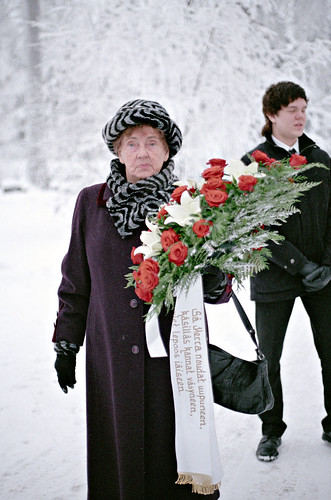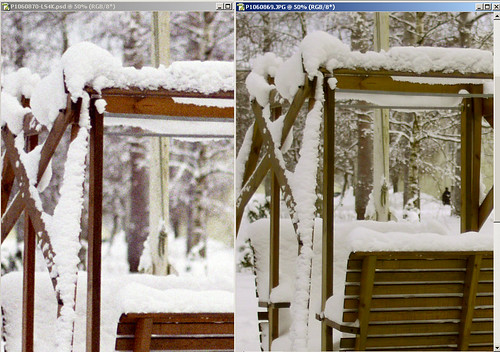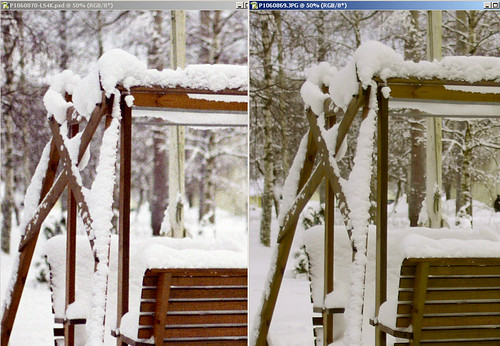This weekend I was photographing a family event and I was after some particular look and feel to my images, rather than the typical (to me) boring digital snapshots.
 This image is from the weekend, to be honest its my personal favorite picture of my grandmother.
This image is from the weekend, to be honest its my personal favorite picture of my grandmother.To me this image is enhanced so much by the soft rendering of the background, thus maintaining a background which still feels further back.
Telephoto fails in the second criteria (angle of view gives less background inclusion), and while backgrounds look blurred they produce a feel far more in close to the subject.
Nothing snaps out from the background looking three dimensional on a print like a normal wide open at this sort of range.
This is exactly where smaller digital formats (such as 4/3) let me down, because even if I had exactly the same focal length at f1.8 the 4/3 format would make the same sort of image as 35mm taken at f4. No matter how much I like my G1 camera
For me one of the real benefits of a larger capture format is that the larger you go the shallower the depth of field is for a normal lens.
Working at no more than a few meters from the subjects normal lenses allow you to capture full body portraits and larger formats allow you to get more blurred backgrounds without having the background seem snuggled up close to the subject.
Now this is the peculiarity of the comparison between 4/3 system and full 35mm sized frames, because in telephoto it works the other way, that is to say that 4/3 makes better use of telephoto because you get that bit more Depth of Field for the same f stop in what is already a very shallow field of view.
To demonstrate this I took two images at more or less the same time, from the same spot; one with my G1 using a FD 28mm lens at f2.8 (wide open as it gets)

and another with my 35mm camera using the 50mm lens at f1.8

now aside from the obvious aspect ratio differences (4/3 is 1:1.33 and 35mm is 1:1.5) even at these small post card sizes (on your screen) on the 35mm frame the swing chair seems to jump out of the image more than the one from the G1. Looking at them full screened (click any image to load that) it becomes more apparent.
Actually the 35mm film is from scanned negative, scanned on my LS-4000 Nikon. I don't have a full frame digital to make the comparisons completely. But this also assists in the notion of return as I can also make comparisons with the image quality and details.
Firstly the LS-4000 scans the film at 4000dpi, meaning that I get an image which is 5578 x 3671 Pixels rather than the 4000 x 3000 which the G1 gives. This is apparent in the image below where all the details are a little bit larger than on the G1 ... notice the amount of the swing visible in each.

So if I then scale the 35mm image to be 3000 pixels high I get almost total equality of feature size in the image.

even on these reduced size link images you can see that the background is more diffuse than the G1 image while the 35mm doesn't actually have much different levels of detail to the G1 image.
This is in keeping with my previous research where I found that film can still be cost effective when compared to high quality digital. Of course if you suffer from camera diarrhea then all bets are off and you may still be better off with film as it will slow you down.
There were some other lessons come out of my weekend, but that's another blog post.
see ya :-)
PS the astute will notice that the above screen shots are all compared at 50% not 100% ... well that's deliberate as I have found that comparing 50% on the screen is really quite similar to close examination of a print of the same image at 300dpi. In the case of the swings above from the 35mm that's a 45cm by 30cm print (17 by 11 inches for those without a calculator) which is (in my opinion) as large as you'd want with stuff like this and really, how often are you printing or planing to be printing larger?









5 comments:
Excellent post as usual, Chris.
I've noticed this "snap" of certain types of images with a "standard" lens and this is a very good explanation of why.
thanks
you know, I might just end up buying a 5D in the near future, simply because I just love this format. 50mm and 24mm became my favorite pair to walk around with. If your not addicted to bloated lenses like the Canon 24-105 USM IS then this pair can give great images with far less cost and far less weight. That is why we have interchangeable lenses ... right?
Indeed. And the original 5D is a great deal nowadays: superb image quality, great build, excellent price. IMHJO, no need to go for the new model. Unless of course you want the video.
I still think full 35mm format is the way to go with dslrs and it's then worth forgetting about zooms galore and sticking to two or three fixed optics.
I'm now using my Zeiss ZM with only three lenses: a Jupiter9 80/2 - superb for portraits, a 'cron 50/2 - for just about everything, and a Nokton 35/1.4 or 35/1.7, depending on the effect I want to get. The 1.7 has smooth vignetting that works very well with landscape.
With film slrs, I'm mostly using two lenses as well: 50/1.2 and 105/2.5. These cover most of the situations and give me the subject "snap" you mention.
Still trying to get the same effect on the D200, with its aps-c sensor. But so far, blank. The nearest I can get is with the 50/1.4 - but nowhere near what I get with film.
I think there's a D700 or similar in my future, at some stage.
Meanwhile, I'm starting to investigate micro4/3 as an evolution to the tired fuji f31fd: still one of the best p&s I've ever had.
I'm drooling at mounting one of my big medium format zeiss lenses on something like a GF1 or the ep-2!
:)
Would go along with the 5D recommendation. Still an excellent camera. I went through three of them!!
With FF its great to have lenses behaving as I expect. Years of 35mm gave me certain expectations of a lens, which has changed with using APS-C and m4/3.
I had a 24-105 IS, wonderful lens but "bloated" is right. I think I only ever took it out once. I value my ability to walk without pain!
I've had the Canon f1.8's (28mm, 50mm & 85mm) for years which I like very much and use for weddings etc. The 50mm f1.8 is a ridiculous price, pure plastic but a really good lens and very light, and the 85mm f1.8 is a gem.
"Camera Diarrhea," that is priceless! I'll probably use that.
I have been thinking about full frame for a while for the same reason in part (also resolution). Unfortunately it means either ponying up boatloads of cash or switching systems to Canon and still ponying up lots of cash (though not as much). Of course, film still works well for me in my trusty film SLR, but I need a good scanner to really make it work. My flatbed is lackluster.
Post a Comment